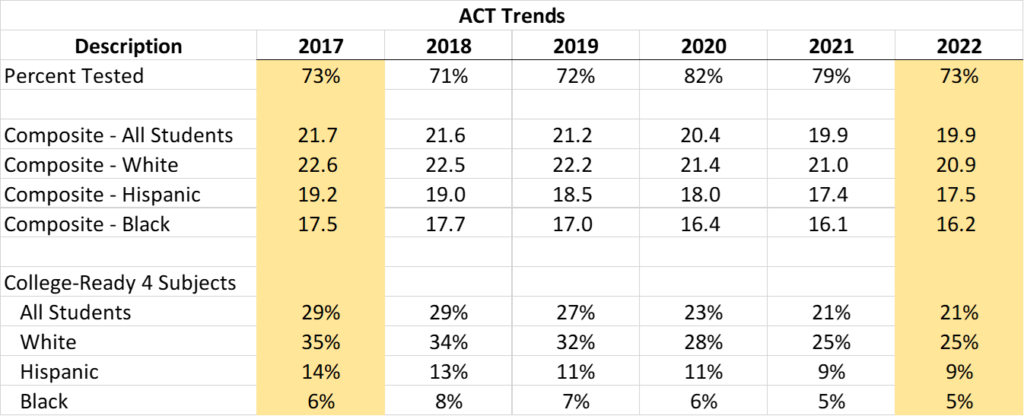The 2022 ACT results are largely a repeat of the previous year. Only 21% of Kansas graduates are college-ready in English, Reading, Math, and Science, and Kansas remains below the national average on many measures. But it may be even worse.
Just 73% of Kansas graduates took the 2022 ACT, down from 79% last year. The Kansas Department of Education says scores decline when participation rises, and the research supports their position. Deputy Commissioner Brad Neuenswander told legislators at a November 30, 2021 hearing that ACT scores would continue to decline until participation is about 95%. Participation jumped in 2020 when the state began paying the test fee for everyone who takes the ACT.
Scores should improve with lower participation, but they didn’t. The last time Kansas had 73% participation, 29% of graduates were college-ready in the four core subjects, but now it’s 21%. The composite score for all students was 21.7, but now it is 19.9.

Senate Education Committee Chair Molly Baumgardner (R-Louisburg) noted that a record 44 Kansas graduates scored a perfect 36, but she is concerned about the drop in participation.
“We have to wonder how much the COVID-related enrollment decline had to do with fewer graduates taking the ACT this year. Headcount enrollment is down 12,500 students from the 2020 school year.
“It’s also disconcerting that most students who are eligible to retake the test at no charge didn’t do so. Research shows that scores tend to improve when the test is retaken. School districts may need to take additional steps to remind students of this opportunity.”
Educational discrimination persists on the 2022 ACT
Education officials say they are opposed to all forms of discrimination, but the 2022 ACT results show that race-based educational discrimination persists in Kansas.
Achievement gaps are about opportunity. It’s not that some kids cannot learn; it’s that income gaps give some kids less opportunity than others. 25% of White students were college-ready in the four core subjects but only 9% of Hispanic students and just 5% of Black students.
Achievement gaps are about opportunity. It’s not that some kids cannot learn; it’s that income gaps give some kids less opportunity than others.
A 2019 Legislative Post Audit study concluded that most of the funding provided to close achievement gaps was not being spent as required in state law. The state school board president responded with a newspaper column that basically said, ‘shut up, go away, we know what we’re doing.’ But arguably, they don’t, as evidenced by the 2022 ACT results and the 2022 state assessment results.



